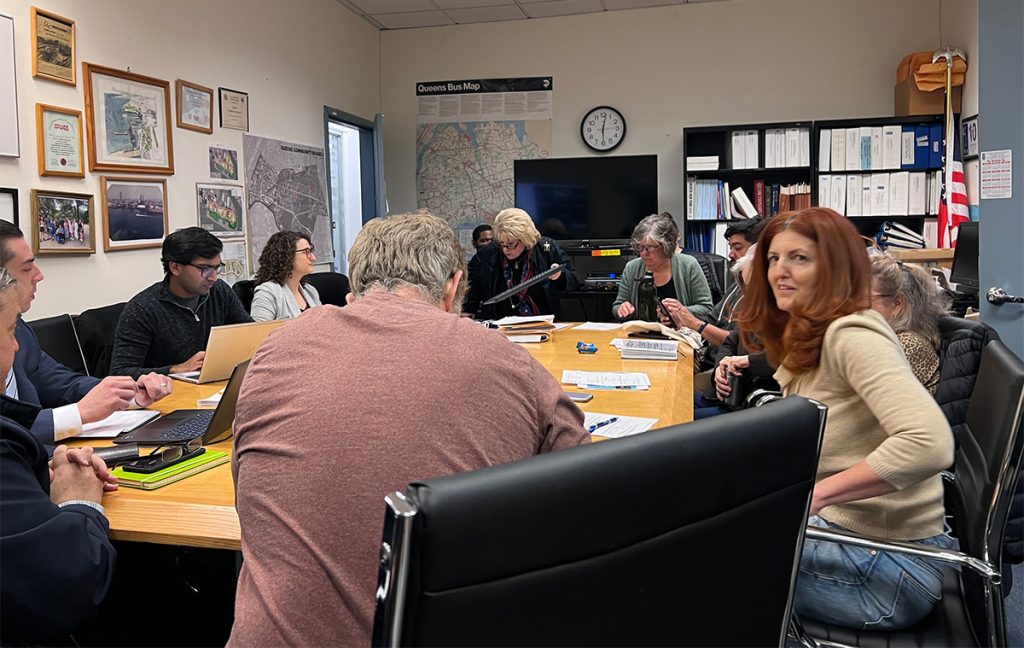
Sunnyside – Woodside – Long Island City
43-22 50th Street, Suite 2B
Woodside, New York 11377
Community Board 2 is one of 59 community boards throughout New York CIty; it is composed of 50 volunteer members appointed by the Queens Borough President Donovan Richards in consultation with the Council Members of the Board district. CB 2 serves as a local representative body of City government. Members must reside or work in the community they represent. CB 2 plays an important advisory role in dealing with land use and zoning matters, the City budget, municipal service delivery and many other issues relating to the community’s quality of life issues.
Land Use Report
February 26, 2024
Land Use Report
The main purpose of the discussion concerned ongoing development that could change the community. Board members, community residents, small business owners and other interested persons were in attendance. The discussion covered zoning, environmental impacts, community needs, and economic benefits. The board meeting aimed at involving the larger population in how land would be used.

Xinlan Tang © copyright 2024
Special Permits, a type of land use regulation that allows certain uses or do not-permit development, were discussed. The Queens Community Board reviewed and recommended special permits in the district. The board disapproved the special permit for a self-storage facility at 30-02 Borden Avenue, associated with various impacts and benefits on the land.
The community would be affected by the following ways: congestion of parking lots, noise from traffic, and public services. An environmental impact assessment was also discussed in the meeting as to how it would affect the community, like congestion. The committee suggested reviews in zoning and housing that could favor residents and be friendly.
The meeting also shared their views with the Department of City Planning. The discussion shows that the department established the district’s new planning. Long Island core city plan study plan on the neighborhood offers challenges aligned with the plan. The study showed that there would be long-term challenges like noise and traffic congestion in the area. It also studied zoning transportation, economic development, and public services. The study involved stakeholders, residents, business owners, and other agents in the community. The board shared the methodology used, presented questions, and provided feedback for the questions asked.
The board recommended changes in zoning and clear guidelines on city planning. The board also discussed the financial management and the budget for the land use plan. The board also assessed the risks associated with the plan and possible outcomes. The plan needed a deep focus to ensure that the developments made would be effective and would not affect the daily lives of residents.
The disapproval of the special permit resulted in much conflict. Residents attending the meeting said that the approval would create employment for people and expand businesses opportunities. They claimed that it was unfair and challenged the opposition, greatly, and it was also beneficial to the government as it would generate revenue. Residents did not understand the need to balance the complexities associated with the matter, such as considering the needs of various stakeholders. The disapproval needed wide public participation so as not to make a decision that would later affect the community in the future. The permit states that the existence of a green environment increases the aesthetic value of the surrounding environment.
Applicants protested the decision. They were not glad about the recommendations made by the committee. They tried to appeal for better resolutions to be effective to avoid favoring a group of the community, but the board did not draw back from the appeal. The rezoning of 37-11 30th Street for the establishment of a hotel that would serve the residents and outsiders. And 43-01 21st Street for a residential building that would offer housing for the growing population in the community and the legalization of a rooftop that would increase business space. The board did not give in to this demand but instead used a different way to execute the issue. It used the perspective that the challenges that would be associated with this zoning would be long-term, and therefore, they rejected the appeal.
The Queens’ board meeting was a very successful and fruitful discussion. Major decisions were made on planning, financial support, and also permit of zoning. The members collaborated properly with the public. The board members proved their commitment to their role to make sure the community is not faced with challenges that they cannot handle. Advancement of ideas was also considered, and the planning department was asked to make changes to improve the plan to be more effective. The ideas presented to them by the people helped them make informed decisions that act as the foundation for the future development of the community.